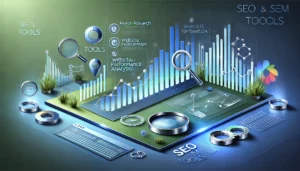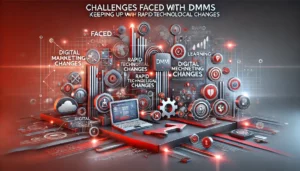What Does a DMM (Digital Marketing Manager) Do? The Unsung Hero of YOUR Digital Success

Digital Marketing Managers (DMMs) are often the unsung heroes behind the success of many online businesses. They play a crucial role in navigating the ever-evolving digital landscape, ensuring that companies stay ahead of the curve. This article explores the multifaceted role of a DMM, their importance in modern business, and how they drive digital success.
Key Takeaways for What Does a Digital Marketing Manager do?
- DMMs are essential for the success of online businesses, guiding them through the complex digital world.
- They use various strategies and tools to boost online growth and customer engagement.
- Continuous learning and adapting to new technologies are crucial for a DMM’s success.
- Building a strong digital marketing team is vital for achieving business goals.
- The role of DMMs is constantly evolving, with new trends and technologies shaping the future of digital marketing.
Understanding the Role of a DMM (Digital Marketing Manager)
Key Responsibilities of a DMM
As Digital Marketing Managers, we wear many hats. Our primary duty is to create and implement effective online marketing strategies. We oversee campaigns, manage budgets, and ensure that our efforts align with the company’s goals. One of our key tasks is to analyse data to understand what works and what doesn’t. This involves using tools like Google Analytics 4 to track performance and make informed decisions. We also collaborate with other departments to ensure a cohesive approach to marketing.
Skills Required for a Successful DMM
To excel in this role, a DMM needs a diverse skill set. Strong analytical skills are crucial for interpreting data and making strategic decisions. Creativity is equally important for developing engaging content and innovative campaigns. We must also be proficient in various digital tools and platforms, from social media to email marketing software. Effective communication and leadership skills help us manage teams and coordinate with other departments.
The Importance of a DMM in Modern Business
In today’s digital age, the role of a DMM is more important than ever. We help businesses navigate the complex online landscape and reach their target audience effectively. By leveraging data and technology, we can optimise marketing efforts and drive growth. Our work not only boosts brand awareness but also enhances customer engagement and loyalty. In essence, a DMM is the unsung hero behind a company’s digital success.
Without a skilled DMM, businesses would struggle to keep up with the fast-paced world of digital marketing. Our expertise ensures that companies stay competitive and relevant in an ever-changing market.
How a Digital Marketing Manager Drives Digital Success
Strategies for Online Growth
We, as Digital Marketing Managers (DMMs), play a crucial role in driving online growth. Our strategies often include a mix of content marketing, social media engagement, and search engine optimisation (SEO). By understanding auction insights, we can tailor our campaigns to outperform competitors. Effective online growth strategies are essential for staying ahead in the digital landscape.
Utilising Data Analytics
Data analytics is at the heart of what we do. By analysing user behaviour and campaign performance, we can make informed decisions that enhance our marketing efforts. This involves using various tools to track metrics and identify trends. The ability to interpret data allows us to optimise our strategies and achieve better results.
Enhancing Customer Engagement
Engaging with customers is more than just responding to comments on social media. It involves creating meaningful interactions that build trust and loyalty. We use personalised content and targeted campaigns to connect with our audience on a deeper level. This not only improves customer satisfaction but also drives long-term success.
In the ever-evolving digital world, the role of a DMM is indispensable. Our expertise in leveraging data and engaging customers sets the foundation for digital success.
Essential Tools and Technologies for DMMs
In the fast-paced world of digital marketing, having the right tools and technologies is crucial for success. As Digital Marketing Managers (DMMs), we rely on a variety of platforms and software to streamline our efforts and achieve our goals. Let’s explore some of the essential tools that every DMM should have in their arsenal.
Platforms a DMM Works With
A Digital Marketing Manager (DMM) interacts with a wide range of platforms to execute their role effectively. Here’s a breakdown of just a few:
Social Media Platforms:
- Core Platforms: Facebook, Instagram, Twitter, LinkedIn, TikTok
- Emerging Platforms: Pinterest, Snapchat, YouTube (as a social platform)
Search Engine Platforms:
- Google Search Console: For SEO management and analysis
- Google Ads: For paid search advertising
- Bing Ads: For Bing search advertising
Analytics Platforms:
- Google Analytics: For website traffic analysis
- Adobe Analytics: For advanced analytics
- Social Media Analytics Tools: Facebook Insights, Instagram Insights, Twitter Analytics
Content Management Systems (CMS):
- WordPress: Popular for website management
- Drupal: For complex websites
- Joomla: Another popular CMS option
Email Marketing Platforms:
- Mailchimp: For email campaigns
- Constant Contact: Another email marketing tool
- HubSpot: For comprehensive marketing automation
Design and Creation Tools:
- Adobe Creative Suite (Photoshop, Illustrator, InDesign): For design assets
- Canva: For graphic design and social media content
- Video Editing Software: Adobe Premiere Pro, Final Cut Pro, iMovie
Project Management Tools:
- Asana: For task management and collaboration
- Trello: For project organisation
- Basecamp: For team communication and project management
Automation Platforms:
- Zapier: For automating tasks between apps
- IFTTT: Another automation tool
- HubSpot: For marketing automation
Marketing Automation Platforms
Marketing automation platforms are indispensable for managing and automating marketing tasks. These tools help us create, execute, and track marketing campaigns efficiently. They allow us to nurture leads, segment audiences, and personalise communications, ultimately driving better engagement and conversions.
SEO and SEM Tools
Search Engine Optimisation (SEO) and Search Engine Marketing (SEM) tools are vital for improving our online visibility. With these tools, we can conduct keyword research, analyse website performance, and optimise content to rank higher in search engine results. Expanded text ads to be sunset in June 2022 is a reminder of how quickly the landscape can change, making it essential to stay updated with the latest trends and tools.
Social Media Management Software
Social media management software enables us to schedule posts, monitor engagement, and analyse performance across various social media platforms. These tools help us maintain a consistent online presence and engage with our audience effectively. By leveraging these platforms, we can create compelling content, track metrics, and adjust our strategies in real-time.
The right tools and technologies can make a significant difference in our digital marketing efforts. They not only enhance our productivity but also provide valuable insights that drive informed decision-making.
In conclusion, equipping ourselves with the right tools is essential for navigating the ever-evolving digital landscape. From marketing automation platforms to SEO and SEM tools, and social media management software, these technologies empower us to achieve digital success.
The Evolution of the Digital Marketing Manager Role
From Traditional to Digital Marketing
Over the years, the role of Digital Marketing Managers (DMMs) has changed a lot. Initially, marketing was all about traditional methods like print ads and TV commercials. But now, with the rise of the internet, DMMs focus more on digital strategies. This shift has allowed us to reach a wider audience and measure our success more accurately.
Impact of Technological Advancements
Technology has played a huge part in shaping the DMM role. With tools like machine learning and data analytics, we can now make better decisions and adapt to changing market conditions. These advancements help us stay competitive and meet the demands of modern markets, where trading can happen 24/7.
Future Trends in Digital Marketing Management
As technology keeps advancing, the role of DMMs will continue to evolve. We might see more use of artificial intelligence and automation in our daily tasks. Staying updated with these trends is crucial for our success. The future looks promising, and we must be ready to embrace new tools and strategies to stay ahead.
Case Studies: DMMs Making a Difference
Successful Campaigns Led by DMMs
In our journey through the digital marketing landscape, we’ve seen numerous successful campaigns led by Digital Marketing Managers (DMMs). One standout example is when Stephanie Mo joined PPC Geeks as a client manager. Her expertise in services like ecommerce, Amazon ads, SEM, and feed optimisation led to exceptional results for extraordinary clients. This case highlights the pivotal role a DMM can play in driving a company’s digital success.
Innovative Strategies in Action
DMMs are often at the forefront of innovation. They craft strategies that not only meet but exceed client expectations. For instance, a DMM might implement a multi-channel approach, combining social media, email marketing, and SEO to create a cohesive and effective campaign. This kind of innovative thinking is what sets successful DMMs apart from the rest.
Lessons Learned from Industry Leaders
From industry leaders, we learn that the key to a successful digital marketing campaign lies in continuous learning and adaptation. DMMs must stay updated with the latest trends and technologies to remain competitive. They also need to balance creativity with data-driven decisions, ensuring that their strategies are both imaginative and effective.
The role of a DMM is ever-evolving, requiring a blend of creativity, analytical skills, and a deep understanding of digital trends. By learning from successful campaigns and industry leaders, we can better appreciate the impact DMMs have on digital success.
Challenges Faced by DMMs
Keeping Up with Rapid Technological Changes
In the fast-paced world of digital marketing, staying updated with the latest technologies is a constant challenge. We must continuously learn and adapt to new tools and platforms. Falling behind can mean losing a competitive edge.
Balancing Creativity and Data-Driven Decisions
Finding the right balance between creative ideas and data-driven strategies is crucial. While data provides valuable insights, creativity drives engagement. We need to blend both to create effective campaigns.
Managing Cross-Functional Teams
Working with diverse teams across different functions can be complex. Effective communication and collaboration are key to ensuring everyone is aligned with the marketing goals.
The role of a DMM is demanding, but overcoming these challenges is what makes it rewarding.
The Educational Path to Becoming a DMM
Relevant Degrees and Certifications
To embark on the journey of becoming a Digital Marketing Manager (DMM), one must first understand the educational requirements. Typically, a bachelor’s degree in marketing, business, or a related field is essential. Some universities offer specialised degrees in digital marketing, which can provide a more focused education. Additionally, certifications in areas like Google Analytics, HubSpot, and Facebook Blueprint can significantly enhance one’s credentials.
Importance of Continuous Learning
In the ever-evolving field of digital marketing, continuous learning is crucial. We must stay updated with the latest trends and technologies to remain competitive. Online courses, webinars, and workshops are excellent ways to keep our skills sharp. Continuous learning ensures we can adapt to new tools and strategies effectively.
Building a Professional Network
Networking plays a vital role in career growth. By connecting with industry professionals, we can gain insights, share knowledge, and discover new opportunities. Attending industry conferences, joining professional associations, and participating in online forums are great ways to build a robust professional network.
Building a strong network can open doors to new opportunities and collaborations, making it an invaluable part of our career development.
Measuring the Success of a DMM (Digital Marketing Manager)
Key Performance Indicators (KPIs)
To gauge the effectiveness of a Digital Marketing Manager (DMM), we rely on Key Performance Indicators (KPIs). These metrics help us understand how well our strategies are working. Conversion rates and customer acquisition costs are crucial KPIs. They show us how many visitors turn into customers and how much we spend to get them. Other important KPIs include website traffic, social media engagement, and email open rates.
Tools for Tracking Performance
We use various tools to track our performance. Google Analytics is a popular choice for monitoring website traffic and user behaviour. For social media, platforms like Hootsuite and Buffer help us keep an eye on engagement and reach. PPC audit tools are essential for evaluating the effectiveness of our paid campaigns. These tools provide insights that help us refine our strategies and improve our results.
Interpreting Data for Strategic Decisions
Data interpretation is key to making informed decisions. We analyse the data collected from our tracking tools to identify trends and patterns. This helps us understand what works and what doesn’t. By interpreting this data, we can make strategic decisions that drive our digital marketing efforts forward. It’s important to stay flexible and adapt our strategies based on the insights we gain.
Measuring success isn’t just about numbers; it’s about understanding the story behind the data. By focusing on the right KPIs and using the right tools, we can ensure our digital marketing efforts are effective and impactful.
The Future of Digital Marketing Management
Emerging Technologies and Their Impact
As technology keeps advancing, we see new tools and platforms changing the way we do digital marketing. From AI to machine learning, these innovations help us understand our audience better and create more effective campaigns. AI-driven insights can predict customer behaviour, making our strategies more precise. We must stay updated with these trends to stay ahead in the game.
Predicted Changes in Consumer Behaviour
Consumer behaviour is always evolving. With the rise of mobile and voice search, people are looking for faster and more convenient ways to find information. We need to adapt our strategies to meet these new demands. Personalisation will become even more important, as customers expect tailored experiences. By understanding these shifts, we can better serve our audience and improve engagement.
The Growing Importance of Ethical Marketing
In today’s world, ethical marketing is not just a buzzword; it’s a necessity. Consumers are more aware and concerned about how their data is used. We must prioritise transparency and honesty in our campaigns. This builds trust and loyalty, which are crucial for long-term success. Ethical marketing also means being socially responsible and considering the broader impact of our actions.
As we navigate the future of digital marketing management, staying adaptable and ethical will be key to our success.
Building a Strong Digital Marketing Team
Creating a robust digital marketing team is essential for achieving online success. We need to ensure that each team member understands their role and responsibilities clearly. This helps in maintaining a smooth workflow and achieving our goals efficiently.
Roles and Responsibilities within the Team
In our team, everyone has a specific role to play. From content creators to data analysts, each position is crucial. For instance, a PPC ad agency specialist focuses on managing pay-per-click campaigns, ensuring we get the best return on investment. Similarly, a social media manager handles our online presence, engaging with our audience and building our brand.
Fostering Collaboration and Innovation
Collaboration is key to our success. We encourage open communication and idea-sharing among team members. This not only fosters innovation but also helps in solving problems quickly. Regular team meetings and brainstorming sessions are part of our routine to keep everyone on the same page.
Training and Development Programmes
Continuous learning is vital in the ever-evolving digital landscape. We invest in training and development programmes to keep our team updated with the latest trends and technologies. Whether it’s a Google ads audit or learning new SEO techniques, we ensure our team is always ahead of the curve.
A well-trained team is our greatest asset. By investing in their growth, we ensure our long-term success.
In conclusion, building a strong digital marketing team requires clear roles, effective collaboration, and continuous learning. By focusing on these areas, we can drive our digital marketing efforts to new heights.
The Global Impact of DMMs
Influence on International Markets
As Digital Marketing Managers (DMMs), we play a crucial role in shaping the global market landscape. Our strategies and campaigns often transcend borders, impacting diverse markets worldwide. By understanding local cultures and consumer behaviours, we can tailor our approaches to resonate with different audiences. This adaptability is key to our success on the international stage.
Adapting Strategies for Different Cultures
One of the most exciting challenges we face is adapting our marketing strategies to fit various cultural contexts. This requires a deep understanding of local customs, values, and preferences. For instance, a campaign that works well in Europe might need significant adjustments to be effective in Asia. Cultural sensitivity is not just a buzzword; it’s a necessity for any DMM aiming for global success.
Case Studies of Global Campaigns
Let’s look at some real-world examples of how DMMs have made a difference globally. Consider the case of a major e-commerce platform that successfully entered the Asian market. By localising their content and utilising region-specific PPC Geeks, they managed to improve landing page experience the right way. This led to exceptional results for extraordinary clients, proving the power of well-executed digital marketing strategies.
The global impact of DMMs is undeniable. Our ability to adapt and innovate across different markets sets us apart as leaders in the digital age.
Digital Marketing Metrics (DMMs) are changing the world. They help businesses understand their customers better and make smarter decisions. Want to see how DMMs can boost your business? Visit our website for a free PPC audit and start improving your ads today!
Digital Marketing Manager: Conclusion
In summary, digital marketing managers (DMMs) are truly the unsung heroes in both the world of electronics and the financial markets. They help your brand succeed across the many digital platforms reaching your customers and driving your CAC lower. As technology advances, the role of DMMs will continue to grow, adapting to new challenges and opportunities. DMMs are indispensable for modern success.
Frequently Asked Questions for Digital Marketing Manager
What is a Digital Marketing Manager (DMM)?
A Digital Marketing Manager, or DMM, is a professional responsible for overseeing and managing online marketing strategies to promote a business or product.
What are the main tasks of a DMM?
A DMM handles tasks like planning digital campaigns, analysing web data, managing social media, and improving online content to boost engagement.
Why is a DMM important for businesses today?
In today’s digital age, a DMM helps businesses reach a wider audience, engage with customers, and stay competitive through effective online marketing strategies.
What skills are needed to be a successful DMM?
Key skills include understanding digital marketing tools, data analysis, creativity, good communication, and the ability to adapt to new trends.
How does a DMM use data analytics?
A DMM uses data analytics to track the performance of online campaigns, understand customer behaviour, and make informed decisions to improve marketing efforts.
What tools do DMMs commonly use?
DMMs often use tools like marketing automation platforms, SEO tools, SEM tools, and social media management software to streamline their work.
What challenges do DMMs face?
DMMs face challenges such as keeping up with fast-changing technology, balancing creativity with data-driven decisions, and managing diverse teams.
How can one become a DMM?
To become a DMM, one can pursue relevant degrees and certifications, continuously learn about new marketing trends, and build a strong professional network.
Author
Search Blog
Free PPC Audit
Subscribe to our Newsletter
The Voices of Our Success: Your Words, Our Pride
Don't just take our word for it. With over 100+ five-star reviews, we let our work-and our satisfied clients-speak for us.
"We have been working with PPC Geeks for around 6 months and have found Mark and the team to be very impressive. Having worked with a few companies in this and similar sectors, I rate PPC Geeks as the strongest I have come across. They have taken time to understand our business, our market and competitors and supported us to devise a strategy to generate business. I value the expertise Mark and his team provide and trust them to make the best recommendations for the long-term."
~ Just Go, Alasdair Anderson







